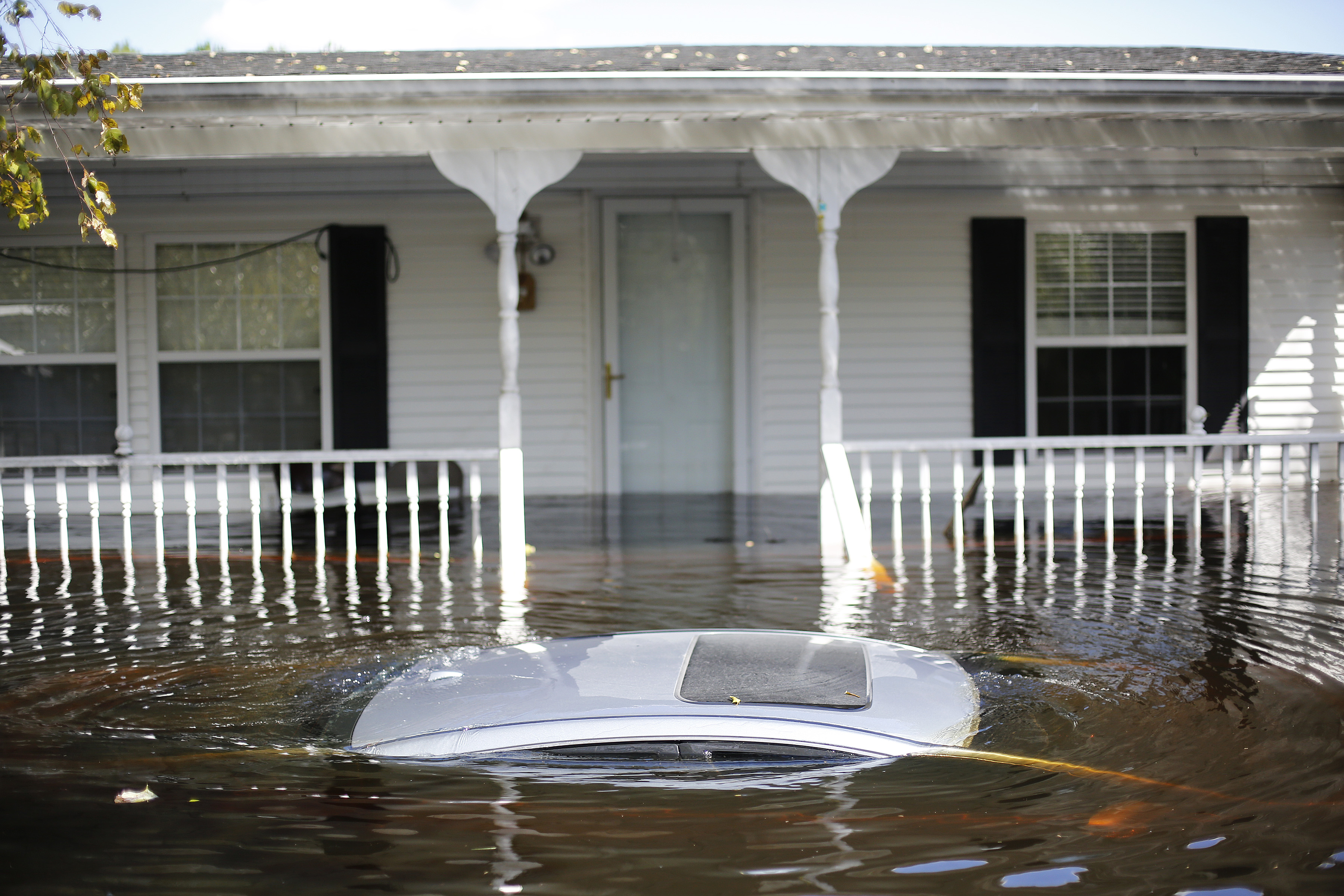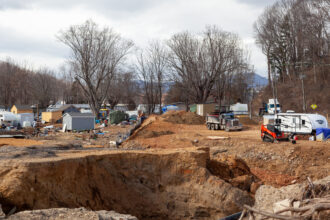The story of the North Carolina Office of Recovery and Resiliency’s disaster response efforts was itself ”a disaster.”
That’s what State Auditor Dave Boliek, a Republican, concluded in a scathing 506-page report released Wednesday, detailing mismanagement that left thousands of Hurricane Matthew and Florence survivors without homes and living in motels for as long as four years.
“The unfortunate truth of this report is the response from North Carolina to Hurricanes Matthew and Florence was a disaster,” Boliek said in a press statement about an agency also known as ReBuild NC. “When government decides to focus on administrative procedures ahead of boots on the ground, hurricane victims get hurt.”
NCORR’s accounting and monitoring was so rife with errors, the state auditor could not determine the full extent of the waste. “We really wanted to be able to show a full financial accounting of everything that happened at NCORR,” Boliek said at a press conference. “But when we took a look at the finances, the time, energy and effort would have cost well over seven figures to bring in contractors to reconstruct a true budget. It wasn’t worth the taxpayers’ dollars.”
A legislative oversight committee will discuss the findings on Thursday at 10 a.m. at a meeting in Greenville. It will also be streamed online.
NCORR received $800 million in federal funds and, when that ran out, another $297 million in state appropriations earlier this year to help eastern North Carolinians return home after the historic storms. Hurricane Matthew occurred in October 2016, followed by Hurricane Florence in 2018.
Most of the money was to be used for the Homeowner Recovery Program, which pays for storm survivors’ houses to be repaired or rebuilt.
The auditor’s office made several key findings:
- NCORR “had no structured financial roadmap or ongoing budget monitoring,” according to the audit. Nearly $785 million in public funds was disbursed to vendors “without a single, reconciled source of financial truth or robust oversight.”
- NCORR did not consistently verify that the contractors performed the work they were paid for. Only one of six program administration contracts include benchmarks for performance.
- NCORR spent more than $25.4 million on design and implementation of the Salesforce platform, which tracked the progress and expenditures related to homeowner projects. But incomplete and inconsistent data in the Salesforce system “led to operational challenges and delayed recovery for many families,” the audit said.
- Homeowners had to navigate eight protracted steps before contractors hired by the state would rebuild or repair their homes. It took an average of four years for hurricane survivors to return home, far longer than the agency’s goal of 18 months. During that time the state covered the costs of motels and storage, expenses that totaled as much as $2.1 million per month.
The state legislature created NCORR after Hurricane Florence, in response to an earlier iteration of the agency that had also fumbled the recovery program.
However, NCORR mismanaged the program nearly from its inception. ReBuild NC failed to hold many contractors accountable for their work and awarded several lucrative contracts to one, Rescue Construction Solutions, which did not install most of its modular homes on time. Rescue consistently denied any wrongdoing.
At the time, the agency’s director, Laura Hogshead, attributed the delays primarily to the pandemic. Hogshead abruptly left her job a year ago, within days of a particularly combative legislative oversight hearing.
“NCORR spent a lot of time on process when their job should have been swinging hammers,” Boliek told reporters on Wednesday.
NCORR had hired an outside company to manage the Homeowner Recovery Program, according to the audit, for a flat fee of $480 per application per month, until an application was formally deemed ineligible in the system.
That led to applications staying in the system—and generating income for the outside company—longer than necessary. When the contractor was managing the Homeowner Recovery Program, each project cost $41,000 in administrative costs, according to the audit. After NCORR brought the management in-house, the cost decreased to just $4,100 per project.
“NCORR staff reported that many applications could have been determined ineligible almost
immediately, but previous NCORR management instructed staff not to send ineligibility
notifications or close cases,” the audit says. “This lack of timely communication forced families to wait unnecessarily, preventing them from seeking alternative solutions for their housing needs.”
But problems persisted and even worsened after the pandemic. NCORR moved money among programs that short-changed some initiatives or eliminated them altogether, state records show.
“They had a pot of money and they spent it,” Boliek said. “They took the attitude that we’re going to spend it and when we’re out, then the program’s over. They didn’t spend money on a mission-oriented project with measurable incremental goals.”
As of Nov. 14, there were 314 households still waiting for new or repaired homes under the Hurricane Matthew or Florence programs, according to state data. More than 3,900 have been completed.
NCORR is expected to finish all projects and disband by October 2026.
In a written response to the auditor, Pryor Gibson, who replaced Hogshead as NCORR director, did not dispute the findings. He wrote that in partnership with the Office of State Budget and Management, the agency has “significantly improved its financial management systems to ensure the program can complete its work and close out in accordance with statutory timelines.
NCORR continues to implement process improvements with regards to strengthening vendor
management, local governments, and construction vendors.”
The auditor’s report is the latest probe into NCORR, state records show.
NCORR lost track of storm survivors who might have been eligible for uniform relocation assistance, according to a September 2024 monitoring report by the U.S. Department of Housing and Urban Development. Such funds help people who are displaced from homes as the result of federally funded projects, such as residents of public housing communities that were damaged by the hurricanes.
In February 2025, three months after Hogshead’s departure, NCORR officials were discovering a more chaotic financial situation than previously known, according to emails obtained under public records law. In some cases, NCORR had incorrectly spent funds on administration expenses for Hurricane Florence that were “in no way affiliated with Florence,” a state compliance specialist wrote, according to emails obtained under public records law.
Officials were also moving money between classifications and programs to cover an $11 million shortfall to rebuild or repair hurricane-damaged homes.
Other expenses were smaller, but suggest a lack of financial oversight: The office was still paying basic charges for state-issued cell phones for several former employees. Other cell phone expenses were being misclassified.
“If we’re not allocating properly, it would be a finding,” wrote Amanda Stapleton, NCORR chief policy officer, in March 2025. “Unfortunately things weren’t done 100% correctly in the past but, I believe we are still here because we want to do things right and successfully fix what we can. This is a good place to implement a change and fix it going forward.”
This story is funded by readers like you.
Our nonprofit newsroom provides award-winning climate coverage free of charge and advertising. We rely on donations from readers like you to keep going. Please donate now to support our work.
Donate NowFederally funded projects have strict accounting protocols. If grant recipients violate those standards, the federal government can recoup the funds. That happened in August, when the U.S. Treasury requested that NCORR repay the federal government more than $800,000 in pandemic-related housing assistance funds that had been disbursed to ineligible households.
North Carolina had received more than $900 million in federal funds during the pandemic for its Housing Opportunities and Prevention of Evictions (HOPE) program. It was part of a $46 billion congressional appropriation to states, territories and local and tribal governments to financially assist eligible households and landlords with rent, utilities and other expenses incurred as a result of the pandemic. Hogshead was also in charge of the HOPE program.
The Treasury Department found NCORR, using HOPE funds, had erroneously paid more than a dozen landlords, people posing as landlords and members of a suspected fraud operation involving a married couple and a limited liability corporation owned by the wife.
The state disagreed with the Treasury Department’s findings and asserted that the payments were eligible at the time, based on federal guidance. It asked Treasury officials to “recognize the good faith compliance described above and reconsider its recoupment demand.”
NCORR could not be immediately reached about whether the amount has been repaid.
About This Story
Perhaps you noticed: This story, like all the news we publish, is free to read. That’s because Inside Climate News is a 501c3 nonprofit organization. We do not charge a subscription fee, lock our news behind a paywall, or clutter our website with ads. We make our news on climate and the environment freely available to you and anyone who wants it.
That’s not all. We also share our news for free with scores of other media organizations around the country. Many of them can’t afford to do environmental journalism of their own. We’ve built bureaus from coast to coast to report local stories, collaborate with local newsrooms and co-publish articles so that this vital work is shared as widely as possible.
Two of us launched ICN in 2007. Six years later we earned a Pulitzer Prize for National Reporting, and now we run the oldest and largest dedicated climate newsroom in the nation. We tell the story in all its complexity. We hold polluters accountable. We expose environmental injustice. We debunk misinformation. We scrutinize solutions and inspire action.
Donations from readers like you fund every aspect of what we do. If you don’t already, will you support our ongoing work, our reporting on the biggest crisis facing our planet, and help us reach even more readers in more places?
Please take a moment to make a tax-deductible donation. Every one of them makes a difference.
Thank you,













